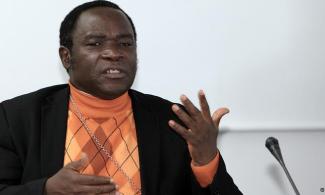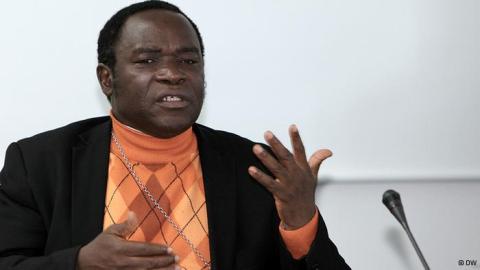
Kukah regretted that the country’s democracy was not developing at the right pace because those making the laws are benefiting from the system collapse.
The Catholic Bishop of Sokoto Diocese, Most Rev. Mathew Hassan Kukah, on Thursday, said unless people in political positions shun nepotism, Nigeria will continue to witness violence and other political crisis.
Kukah regretted that the country’s democracy was not developing at the right pace because those making the laws are benefiting from the system collapse.

Kukah, the Convener of the National Peace Committee, stated this while featuring on Channels Tv in an interview monitored by Daily Trust.
He said, “The problem with Nigeria’s situation is that the sinners are the ones trying to make the law. These are the consequences of where we find ourselves now."
The Catholic Bishop lamented the continued closure of the Universities on account of the strike embarked by the Academic Staff Union of Universities (ASUU), describing it as unhealthy for the nation's development.
“I speak to the fact that as long as the universities are the way they are, as long as we do not have privileged intellect and the diagnostic tools required to refine processes, as long as we are hoping that politicians are the ones to set their own rules, as long as we expect that almost all of these are politics, there would not be an improvement in the country.
“In my view, had it been we have a country that is working, a country that takes research seriously, it is the business of political scientists to equip the people in power with the required tools for analysis, to the options that are available to ensure things go the way they should go.
“But unfortunately, if you have a situation where the universities are not funded, the country itself behaves as if it wants to close the universities, what else do you expect?
“Unless and until this government and other governments in Nigeria take academic exercise very seriously, we cannot expect the person who is sick to be the one to provide the medicine for his cure,” he stressed.
He slammed members of the National Assembly for being only concerned about their privileges and opportunities instead of focusing on problems of Nigeria.
Speaking about his committee’s effort to entrench a peaceful electoral process, especially in Ekiti State, where a governorship election would hold on Saturday, Kukah said the committee was looking at all options to ensure that elections are free from violence.
He said: “As you can see from the enthusiasm of our people trying to get their PVCs, it seems that by the day, our people and our democracy are all maturing.
“The challenge really is for political actors to work the talk, for the political actors to become responsible and more responsive to the issues of ordinary Nigerians.
“Ordinary citizens are well ahead of the political actors in terms of what they want, how they see things and they understand the issues.”
He said the amendment in the electoral law would instil greater confidence in Nigeria’s democracy.
“Gradually, as the quality of people’s lives is increasing, people can become a little bit relaxed but for now, politics in Africa and Nigeria seems to be a bit tense because of the nature of the sharing of the political benefits.
“If people in power continue to practise nepotism when people feel that they have voted and the people who are benefiting are those who have just come out of the comfort of their rooms, they are bound to feel frustrated. These are ingredients for violence in Nigerian politics.”